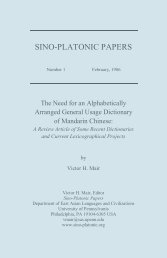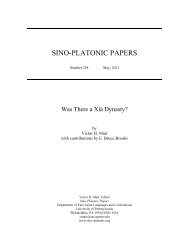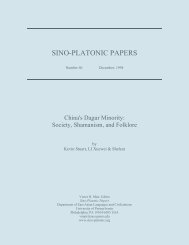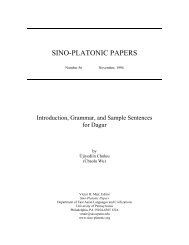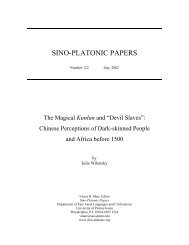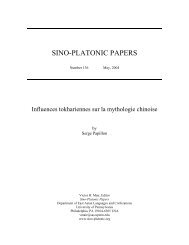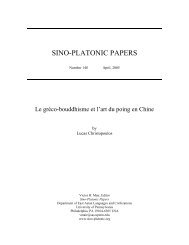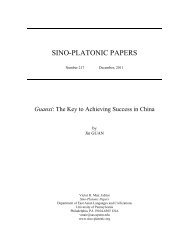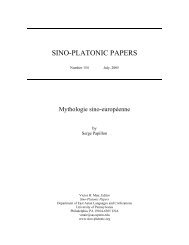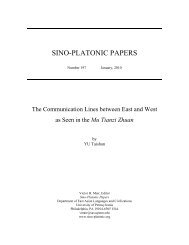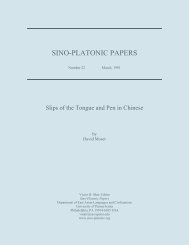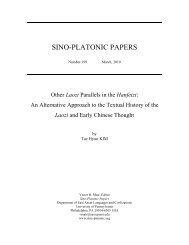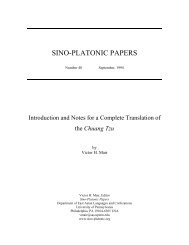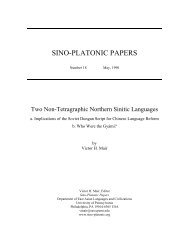Zhuangzi, Mysticism, and the Rejection of Distinctions
Zhuangzi, Mysticism, and the Rejection of Distinctions
Zhuangzi, Mysticism, and the Rejection of Distinctions
Create successful ePaper yourself
Turn your PDF publications into a flip-book with our unique Google optimized e-Paper software.
Sino-Platonic Papers, 100 (Febl"lJaIY,.-2000).. 17<br />
This relatively moderate advice to ab<strong>and</strong>on moral distinctions, such as <strong>the</strong><br />
distinction between right <strong>and</strong> wrong, is supported by Mair's translation <strong>of</strong> an<br />
important passage from chapter two: ''Now, <strong>the</strong> manifestation <strong>of</strong> right <strong>and</strong><br />
wrong is what diminishes <strong>the</strong> Way. ,,33 But Graham insists that in this passage<br />
Zbuangzi is recommending more than moral antinomianism. His translation<br />
says, "The lighting up <strong>of</strong> 'That's it, that's not' is <strong>the</strong> reason why <strong>the</strong> Way is<br />
flawed. ,,34 Mair's translation suggests that <strong>Zhuangzi</strong> thought our ability to<br />
follow <strong>the</strong> Daoist path <strong>of</strong> action is diminished when we become ensnared by <strong>the</strong><br />
phony distinctions <strong>and</strong> disputations <strong>of</strong> moralists. So we should avoid making<br />
moral distinctions. Graham, on <strong>the</strong> o<strong>the</strong>r h<strong>and</strong>, treats <strong>the</strong> Way like <strong>the</strong> Dark<br />
Pearl. When we try to light it up by distinguishing what is from what is not, our<br />
underst<strong>and</strong>ing <strong>of</strong> it is distorted. So we should avoid making distinctions.<br />
Loy follows Graham's translation, not Mair's; so his interpretation <strong>of</strong><br />
Zbuangzi is extreme <strong>and</strong> anti-rational. He overlooks <strong>the</strong> possibility that<br />
<strong>Zhuangzi</strong> was speaking <strong>of</strong> shi <strong>and</strong> fei as moral terms, like one <strong>of</strong> our uses <strong>of</strong> <strong>the</strong><br />
English terms "right" <strong>and</strong> ''wrong. " That would have allowed for a moderate<br />
treatment <strong>of</strong> <strong>the</strong> advice to ab<strong>and</strong>on distinctions, namely: "Just ab<strong>and</strong>on <strong>the</strong><br />
moral ones." Loy is mislead by Graham's translation <strong>of</strong>shi-fei as "That's it,<br />
that's not." He assumes that by shi-fei <strong>Zhuangzi</strong> understood, " ... <strong>the</strong><br />
discriminations that we have allleamed to make in <strong>the</strong> process <strong>of</strong> coming to



